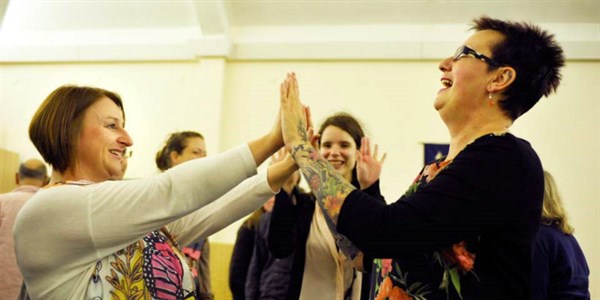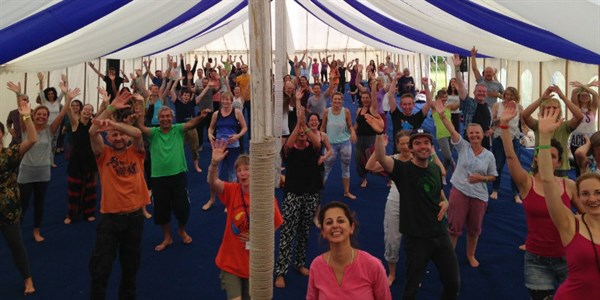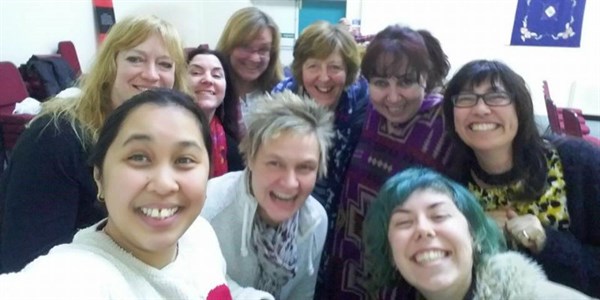Laughter yoga for mental health
06 Oct 2016 | Joe Hoare

"I feel
better"
This is the most common reply I get to the question "how do you
feel when you laugh?" and the reason is because there's magic in
laughter.
When we laugh in an open and good-natured way, we are
experiencing a moment of joy, of present-moment awareness, and
quite possibly exuberance. In such a moment, we are enjoying our
life, so we feel better.
This experience is the antidote to stress, anxiety, worry and
worse. Psychologically, it builds our resilience because feeling
good is an empowering experience. "Feeling better" feeds our
resourcefulness and helps us deal better with life's challenges. It
improves our mental health and gives us a more positive and
optimistic outlook.
"Choose to be optimistic. It feels better"
~ The Dalai Lama
Fortunately, optimism is a quality we can all develop.
Psychologically, we need to go through a process where we challenge
our non-optimistic thoughts and feelings, and based on our own
experience, replace them with more realistic and accurate ones.
This is proven current psychological practice and at the heart
of several approaches to improving mental health.
Laughter yoga helps these processes. There is a simple laughter
yoga exercise which involves smiling. In this exercise, you smile a
genuine and good-natured smile for 10-15 seconds, ideally at
yourself in a mirror.
Doing this usually requires a psychological shift because to
keep your smile genuine (ie not be false and insincere), you have
to you take control of your mood and put it into a good-natured
state. This is brain-training, and can be transformative.

"What I have learnt …… is being able, at any
moment, to choose to enter the state of having a genuine warm
smile and that this has a transformative effect on me. It is
as if I have found the last piece of a jigsaw, which holds
everything together"
Laughter yoga is often thought of as a group activity, and it
usually is. However, as with almost every other practice, it is one
that can be on your own too. Learning to keep the practices going
when on your own allows the benefits to deepen and grow.
"On the first day I woke up with a headache and
cold and was reluctant to start. Even though I felt ridiculous, I
still smiled and by the end was genuinely laughing; it's amazing
how such a simple task can have a positive effect on your day"
So, even on our own we can use laughter yoga to improve our
mental health.
However, laughter yoga is also a group activity. When we do our
laughter yoga in a group, it builds connection. One of Dr Kataria's
great insights at the outset of laughter yoga was that when we
connect with someone else while doing laughter yoga, we become more
playful and spontaneous and therefore even more good-natured.

Connection is an antidote to loneliness. Because loneliness is a
major contributor to mental ill-health, the group activities of
laughter yoga also help promote mental good health.
But there is much more to laughter yoga than just the
psychological aspect. Laughter yoga is a mind-body / body-mind
activity. It also uses physical activity and exercises to energise
us, and to help us engage with our innate playfulness.
The mind-body / body-mind quality helps activate the biochemical
changes on several levels simultaneously, and these changes have
been shown to have benefits that can last up to 24 hours. All we
need do is keep topping up the benefits.
"People often say that motivation doesn't
last. Well, neither does bathing - that's why we recommend it
daily" ~ Zig Ziglar
I myself have used laughter yoga smiling exercises for years. I
use them at the start of my day, every day. The most
straight-forward benefit I have noticed is that morning grumpiness
has been banished.
I do the exercise until I feel my mood access a good-natured
state of mind, and I feel that experience through my whole body. I
do this exercise particularly when tired, sleep-deprived, "rough"
or under pressure because exactly as one my clients commented, I
too have "found that any task I was going to do post exercise
became easier."

Here is the exercise I do and recommend:
- As early as possible in your day, smile warmly and genuinely
for at least 10-15 seconds. (This takes a small amount of focus and
persistence.)
- Even better is to do this exercise in a mirror so you're
smiling at yourself. If you find this too difficult at first, just
do the simple smiling. It's the 10-15 second aspect that's
important.
- At the end of your day, repeat this exercise.
- Before going to sleep, write down 3 things you've appreciated
and/or been grateful for today.
- During the week, please be on the lookout for signs that life
might be going better. These signs can be easy to miss: an
unexpected feeling of comfort; feeling more relaxed in a previously
stressful situation; some enjoyment; thinking differently. Keep
alert for these indicators that life is going better, and write
them down.
I hope this simple laughter yoga exercise has the same benefit
on your mental health as it has on mine and thousands of
others.


Joe Hoare is an expert in laughter yoga, who inspires
conferences, energises teams, coaches individuals and runs
"laughter yoga with Joe", Laughter Facilitation Skills courses. www.joehoare.co.uk